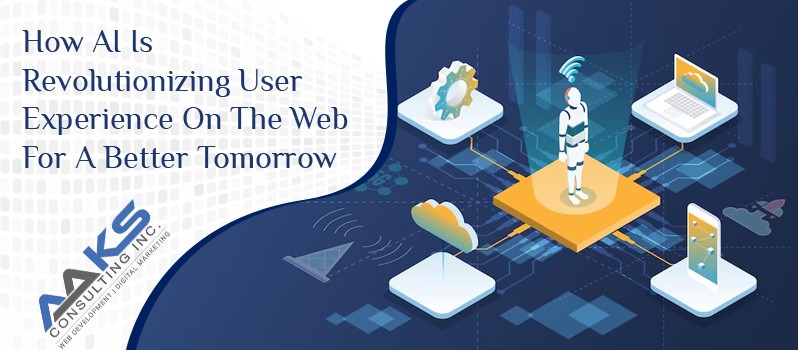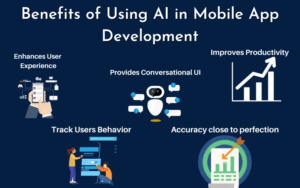How AI Is Revolutionizing User Experience On The Web For A Better Tomorrow
In the age of technological advancement, Artificial Intelligence is also making leaps and bounds in the web design landscape. AI is becoming increasingly integrated into websites to provide more personalized experiences for users. In this article, we will explore how AI is revolutionizing user experience on the web for a better tomorrow.
Introduction to AI and How it Impacts User Experience
Artificial intelligence (AI) is poised to revolutionize the user experience (UX) on the web. With AI, businesses will be able to personalize the web experience for each individual user in real time, providing a truly unique and tailored experience. This will result in a more engaging, interactive, and ultimately more enjoyable web experience for everyone.
But how exactly will AI impact UX ? Here are some ways:
1. Smarter search: With AI powering search engines, results will become more accurate and relevant to the user’s query. This means that users will be able to find what they’re looking for more easily and quickly, resulting in a better overall UX.
2. Improved recommendations: Based on a user’s past behavior, AI can provide better recommendations of products, services, or content that they may be interested in. This personalized touch will make the overall web experience more enjoyable for the user.
3. Faster loading times: By optimizing web content for each individual user’s needs, AI can help reduce loading times and make websites more responsive. This leads to a smoother and faster browsing experience for everyone involved.
4. Greater security: As cyber threats continue to evolve, AI can play a vital role in keeping users’ data safe and secure. By identifying potential threats and taking action accordingly, AI can help create a safer online environment for everyone involved.
5. Better accessibility: By making website content more accessible to users with disabilities, AI can help create an inclusive UX for everyone. AI can be used to detect any potential accessibility issues and then provide solutions that make the web experience more accessible to people of all abilities.
In short, AI can have a huge impact on the overall user experience. By making websites smarter, faster, and more secure, businesses can ensure that every individual user has a tailored web experience that is both enjoyable and productive.
The Benefits of AI on the Web
Artificial intelligence (AI) has been a hot topic in the tech industry for years now, and its impact on the web is only growing. Here are some of the ways AI is revolutionizing user experience on the web for a better tomorrow:
1. Smarter search engines: AI is helping to make search engines smarter and more accurate. By understanding user intent and delivering more relevant results, AI-powered search engines can make your web browsing experience more efficient and enjoyable.
2. Personalized recommendations: Another way AI is enhancing the web is through personalized recommendations. Based on your past behavior, AI can provide you with tailored content suggestions that are more likely to be of interest to you. This not only saves you time, but also ensures that you see content that’s more relevant to your interests.
3. Improved security: As we become increasingly reliant on the web, security concerns are also growing. However, AI can help to address these concerns by providing enhanced security features such as facial recognition and biometric authentication.
4. Enhanced accessibility: One of the great advantages of AI is that it can help to make the web more accessible for everyone. Through features such as text-to-speech and screen-reading capabilities, AI can help people with disabilities access and use online content with ease.
5. Greater efficiency: Last but not least, AI can also help to make various processes on the web more efficient. From automating tasks such as data entry to providing intelligent insights into customer data, AI can help to streamline the way we do things on the web.
Examples of AI in User Experience
1. Personalization: AI can help to personalize user experiences on the web by providing recommendations and suggestions based on previous behavior.
2. Improved search: AI can help improve search results by understanding the user’s intent and providing more relevant results.
3. Enhanced customer support: AI can help provide enhanced customer support by helping to resolve issues faster and providing personalized assistance.
4. Increased efficiency: AI can help to increase efficiency by automating tasks and processes that would otherwise be manual.
5. Improved decision making: AI can help improve decision making by providing insights and recommendations based on data analysis.
Challenges Faced by Developers When Incorporating AI into UX
As artificial intelligence (AI) becomes more prevalent in our everyday lives, it’s only natural that developers would want to incorporate it into their user experience (UX) designs. However, there are challenges that need to be considered when doing so.
One challenge is that AI technology is constantly changing and evolving, which can make it difficult to keep up with the latest trends and developments. This means that developers need to be continuously learning and keeping up to date with the latest AI advancements.
Another challenge is that AI-powered UX designs can be complex and require a lot of computing power. This can be costly and may not be feasible for all developers. Additionally, users may not be comfortable with using an AI-powered UX, preferring a more traditional design.
Finally, developers need to consider the ethical implications of using AI in their UX designs. As AI gets smarter, there is a risk of it becoming biased or even sexist and racist. Developers need to ensure that their AI-powered UX designs are ethically sound and do not discriminate against any group of people.
Potential Solutions for Integrating AI into UX
There are many potential solutions for integrating AI into UX. One popular solution is to use chatbots. Chatbots can be used to help users with tasks such as customer service, making recommendations, or providing information. Another solution is to use AI-powered search engines. These search engines can help users find the information they need more quickly and easily. Additionally, AI can be used to create personalized user experiences. For example, AI can be used to customize the content that is shown to a user based on their interests and needs. Finally, AI can be used to create new user interface designs that are more efficient and effective for users.
Future Outlook for AI and UX Integration
The future of AI and UX integration is looking very promising. With the rapid advancement of AI technology, there is no doubt that AI will play a big role in shaping the future of UX design. Here are some ways that AI will revolutionize UX design in the future:
1. Smarter and more personalized user interfaces: One of the most exciting things about AI is its ability to create smarter and more personalized user interfaces. In the future, AI-powered user interfaces will be able to learn about users’ preferences and tailor the experience accordingly. This will result in a much more efficient and enjoyable user experience.
2. Improved search functions: Another area where AI will have a big impact on UX design is in search functions. With the help of AI, search functions will become much more accurate and relevant to users’ needs. This will make it easier for users to find what they’re looking for online, resulting in a better overall experience.
3. Greater accessibility: One of the goals of UX design is to make sure that websites and apps are accessible to as many people as possible. In the future, AI can help achieve this by providing alternative versions of content for people with different disabilities. This will make it possible for everyone to enjoy using websites and apps, regardless of their abilities.
4. Enhanced security: Security is always a top concern when it comes to online experiences. In the future, AI can help improve security by providing advanced authentication methods and detecting suspicious activity. This will help keep users’ data safe and secure while they are using the internet.
Overall, AI has the potential to revolutionize UX design in many ways. Its integration into user experience design is only just beginning, but its impact on the way we interact with digital products and services will undoubtedly be immense.
Conclusion
Artificial intelligence (AI) has been a game-changer in the way user experience is designed and delivered on the web, providing users with smarter and more personalized experiences. As Artificial intelligence (AI) continues to evolve and become more sophisticated, it is likely that its capabilities will be further leveraged to improve user experience even further. By harnessing the power of AI, businesses can create unique and powerful experiences for their customers that are tailored to their specific needs – ultimately creating an environment where everyone wins!





